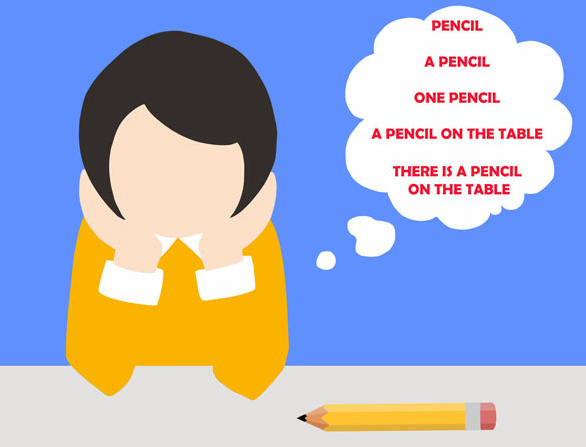Train Your Brain to Think in English
If you live in a place where most people speak the language you are learning, you may use the language for several hours each day.
So, it may become part of your "inner speech." In other words, you start thinking in that language. Your mind stops trying to translate things from your native language into the second language.
But, the majority of the VOA Learning English audience lives in places where English is not the main language.
This may be true for you. You may not have many chances to practice English. You may even be self-taught.
When you speak, your speech might be slower than you would like. This is because your mind is still translating from your first language, which can also sound unnatural. English, like every other language, has its own sentence structure.
The good news is that thinking in English can bring you a huge step closer to fluency! It is not very difficult, but it does take conscious effort and practice.
On today's Education Tips, we will share some mental exercises that can help.
Most experts note that it's best to start small. So, a good first step is to think in individual words.
Look around you. What do you see? In your head, try to name each object in your surroundings.
Charles Thomas has taught English to Union members, children and teenagers for over 10 years. He has also helped open schools in several countries. He currently works for EF International Schools in Washington, D.C.
Thomas tells his students to name the things that they see around them, wherever they are.
"As you continue with this, it becomes more of a habit, so things are going to pop up into your head – computer, telephone, chair, desk. Whatever it is...wherever you are."
Start with nouns and then add in verbs, he suggests.
He says you can also do this at home when you wake up and before you go to sleep.
Teacher Andrew Hinshaw also finds this exercise helpful.
He has been teaching English for 12 years, including in Vietnam for the U.S. Department of State. He currently teaches at the Carlos Rosario International Public Charter School in Washington, D.C.
Hinshaw remembers one method some of his Vietnamese students liked.
"I've had students tell me that they label everything in their room or their apartments so that these English words, kind of, stick in their heads."
Another exercise that both Thomas and Hinshaw suggest is describing in your mind objects you don't know the words for.
An example would be if you couldn't think of the word "garage," Thomas says.
"If you're looking at your house and you see your garage, but you can't think of the name in English. You can say, ‘The place inside where I put my car' or you can say, 'It's next to my house. I keep things there.'"
He says you can also use shorter phrases, such as "It's similar to..." or "It's the opposite of..."

Hinshaw says doing this can help learners of any language. As a Spanish learner, he does it himself.
The next exercise is thinking in simple sentences.
For example, if you are sitting in a park, you can tell yourself things like, "It's such a beautiful day" and "People are playing sports with their friends."
Once this becomes easy, you can move on to more difficult sentences.
Hinshaw sometimes uses this exercise to think about what he wants to say to people in Spanish.
"I definitely try to say these sentences in my head or try to put the words together without thinking too much about if it's absolutely correct."
Another exercise experts suggest is to describe your daily activities. There are a few ways to do this.
Thomas asks his beginning-level students to describe their day using the simple present verb form. So, they would think to themselves things like, "I put on my shirt" and "He drives the bus."
Other experts say you can mentally make plans in the morning when you wake up. This would require other verb tenses. So the skill level is a little higher.
For example, you might tell yourself, "When I leave the house, I'm going to get an iced coffee. Then, I'll take the train to class. I'm studying with Paola today. She said she booked a study room at the library for 2 p.m."
Now, let's move to thinking in conversation.
When you do this, you are imagining yourself speaking to someone else. You are asking the questions and thinking of replies.
This is a great way to practice what you might say in a real conversation.
For example, let's say the imaginary person asks you a question like, "What did you think of the award show last night?" How would you answer? Imagine the conversation and practice it in your head.
You can do this out loud or in silence.
For all of these exercises, there will of course be words and phrases that you do not know. So, at some point you will need to use a dictionary.
If your skill level is high enough, you might consider using an English-to-English dictionary.
Hinshaw suggests writing down just five to 10 new words and phrases each day.
Keeping a notebook, he says, helps you remember the situation that you needed that word or phrase for. This makes it easy to recall when you are in such a situation again.
So, how much time should you spend on these exercises?
Thomas says do a little every day.
"So when you're doing it every day, over and over again, little by little, that's the key. Because, when you make things a habit, then it just pops up into your mind without thinking and then, before you know it, really, you're thinking in English."
I'm Alice Bryant.











